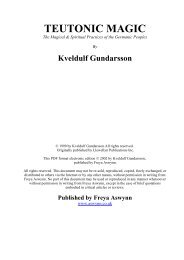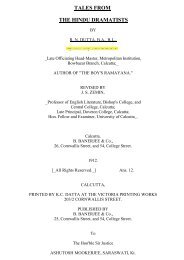Untitled - Awaken Video
Untitled - Awaken Video
Untitled - Awaken Video
You also want an ePaper? Increase the reach of your titles
YUMPU automatically turns print PDFs into web optimized ePapers that Google loves.
Chapter 6. The Sky 159<br />
the Afterlife. Prior to the coming of Christianity to the North, the concept of an<br />
Afterlife was basically a continuation of life on Midgard among the Ancestors with<br />
the exception of some very special circumstances, either in the case of a violent death<br />
as mentioned earlier or in the case of a great king/ military leader. Information<br />
collected from various sources such as archeological finds, written documents of<br />
recorded burial customs, anecdotal information from family sagas as well as from the<br />
eddaic poetry all indicate that the concept of Valhalla being the “warrior’s paradise”<br />
is most likely late in origin and may have even been influenced by the Christian<br />
preaching of “going to sit at the right hand of the Father.” In fact, Valhalla in its<br />
form as the Hall of the Slain may have originally been conceived as being connected<br />
to the Hall of Hel with only the daily battlegrounds being in the sky realm. 24<br />
Even in this day and age, however, the concept that those making the journey<br />
to the Land of the Dead are not on their way to live in the Halls of their Gods is<br />
not so strange. What makes it difficult for many to understand is that the western<br />
civilizations have been so indoctrinated by pop-Christianity that they can no longer<br />
understand the function of the Gods and the role that They play in the Universe.<br />
Ego-centric philosophy has led many to believe that Gods or divine powers exist<br />
only for the sole entertainment of Their worshipers. This type of philosophy does<br />
not yet exist in many Third World countries (190, 191, 192).<br />
The ancient Gods did not often deal with individuals (with the exception of<br />
Óðínn) but dealt with the welfare of entire communities. For the ancient Germanic<br />
peoples, individual help, wisdom, gifts, luck, power, etc. came primarily from the<br />
Ancestors and from each individual’s dealings with other lineages upon Midgard.<br />
The Gods did not often interfere with an individual’s life because Their main concern<br />
was the well-being of Yggdrasil and the staving off of the Ragnarök until as far into<br />
the future as possible . The community system of the sky-realm was for the Gods<br />
to gather in council each day and to decide upon the organization or reorganization<br />
of the homes within the World Tree. Snorri described this court only briefly:<br />
“The third root of the ash extends to heaven, and beneath that root is a<br />
well which is very holy, called Weird’s [sic] Well. There the Gods have their<br />
court. Everyday the Æsir ride there up over Bifröst. It is also called As-bridge<br />
. . . . And Thór walks (as opposed to horseback) to the court and wades rivers<br />
whose names are: Kormt and Ormt and two Kerlaugs, these shall Thór wade<br />
everyday when He is to judge at the Ash Yggdrasil, for As-bridge burns all<br />
with flame, the holy waters boil.” 25<br />
24 The reader is referred to H. R. Ellis-Davidson’s Gods and Myths of Northern Europe, 1964,<br />
chapter 6, (Penguin Books; Middlesex, UK).<br />
25 Faulkes, 1987, pp.17-18.
















